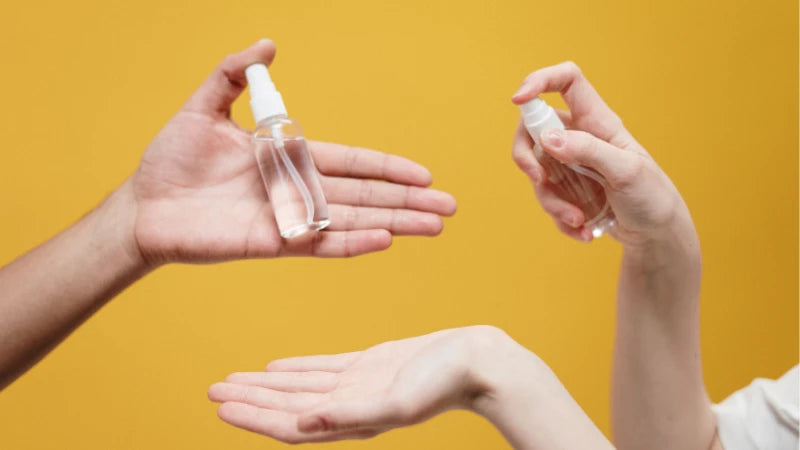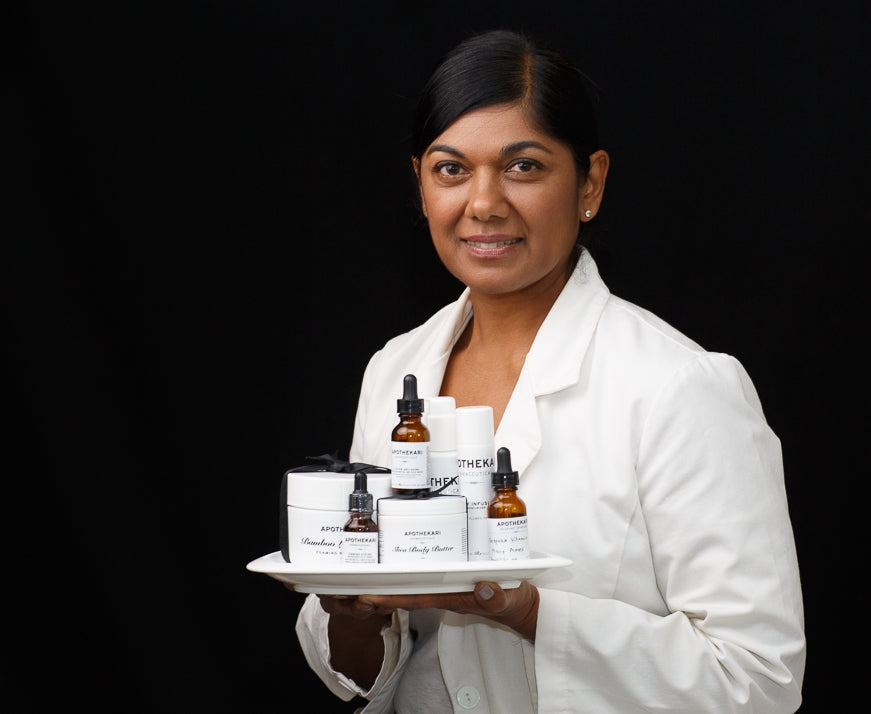Blog
Safe Skincare. What You Need to Know
Go down the internet rabbit hole for long enough, and you’ll start to question if safe skincare products exist. Is danger lurking in those pretty bottles sitting on your counter? Thankfully, for the most part, there’s little cause for concern. Many companies (including us!) make safe skincare, and in this post, learn how to choose them. Shop All Apothekari Is The Beauty Industry Regulated? It’s common misconception that skincare products aren’t regulated in countries like the United States and Canada. But, this just isn’t true. In the USA, the Federal Food, Drug and Cosmetics Act, overseen by the Food & Drug Administration (FDA), regulates cosmetics. And in Canada, Health Canada establishes guidelines for safe skincare. If you’re going to sell a product in Canada, it must be registered with Health Canada (ours are). The rules differ amongst countries, but most developed nations, including the European Union, Japan, Australia, and others, have agencies which set rules that cosmetics companies must comply with. How can you protect yourself? Purchase from reputable companies whose products are registered with their country’s agency. Not sure? Ask. Unregistered products are a red flag that should make you reconsider your purchase. Are Skincare Products Harmful? While the ingredients in skincare products are regulated, the words used to market them are, unfortunately, not! Fear marketing is really effective so many companies use it to get you to buy—or not buy—something. Sadly, the beauty space is filled with mistruths that aren’t backed by science. They’re not only misleading, they’re also very confusing for most customers. At Apothekari, your wellness comes first. Our founder is a pharmacist and those values guide us in everything that we do. Scientific research dictates our formulations and we don’t resort to unsubstantiated claims. We stand by our products and operate with honesty and integrity. Fear isn’t something that we use to scare you into buying our products. How Do You Know if a Skin Product Is Safe? In a world filled with lots of noise, who can you trust when it comes to choosing safe skincare products? Like shopping for anything, the key is to be an educated consumer. Beyond looking for products registered with the relevant regulatory body, and being wary of fear marketing, here’s what’s important: Is The Product Preserved? Despite what you may hear, preservatives are not scary! What is scary, are products that aren’t preserved. Preservatives are essential in any product that contains water to protect you from harm that may be caused by bacteria, fungi and mold. You may be concerned about parabens, but many companies are now using alternatives. If the product contains water, AND says it’s preservative-free, then either the formulator is lying (some of the ingredients may contain preservatives and they don’t need to be listed on the label) or even worse, it’s made by someone putting your health at risk. Read more here. Get to Know Your Ingredients. Don’t be scared by chemicals, because whether synthetic or straight from nature, everything is a chemical. A ‘chemical-free’ product would not only be completely ineffective, it would be impossible to find. Good and bad ingredients can be ‘natural’, ‘green’ and ‘clean’ (unregulated marketing terms, which can mean anything), or made in a lab. It doesn’t matter where it comes from – what’s important is whether it’s safe and effective. Who to trust when it comes to ingredient safety? Again – be cautious about organizations who want to scare you. Here’s a good read. Understand What Works for You. We’re all unique so what works for your best friend may not be so great for your skin. Some of us may be fine with fragrances, while some of us may not. Only you know your body. Get used to reading labels so you can decide for yourself. Knowledge is power. Where do you turn for information when it comes to the safety of your skincare products?
Learn moreCosmeceutical, Defined
When it comes to skin care, you’ve no doubt come across the word, cosmeceutical. The term is being used more frequently and is a hybrid of two words – cosmetic and pharmaceutical (drug). A cosmetic is a product that enhances your beauty and appearance while a drug is something that is used to prevent or treat a disease. The word cosmeceutical was coined by Raymond Reed, founder of the U.S. Society of cosmetic chemists, in 1961 and was popularized in the 1970s to refer to cosmetic products that contain active ingredients claiming to enhance the appearance of your skin. What Are Dermaceuticals? What about dermaceutical then, as it pertains to our brand – Apothekari Dermaceuticals? Like cosmeceutical, it is a hybrid of two words – derma, derived from dermis (the dense inner layer of skin beneath the epidermis) and cosmetic. Like cosmeceutical, these two terms are often associated with skin care brands that are science based and for the most part, may be used interchangeably. In general, cosmeceuticals are non-prescription products, which are sold over the counter. Cosmeceuticals contain ingredients including retinoids, antioxidants, alpha hydroxy acids and peptides. These active ingredients are not drugs but have known physiologic effects and will improve the appearance of aging skin over time. Cosmeceuticals Can Deliver Results The words cosmeceutical or dermaceutical are not recognized legally (i.e., they are not regulated by the Food and Drug Administration, Health Canada or the European Union) so cosmetics companies must be careful in their marketing and stating of benefits because their products don’t undergo the same amount of vigorous testing that is required for drugs. While the ingredients that make up a skin care treatment may have many beneficial properties, manufacturers cannot market products with claims for purposes such as treating or preventing disease, or affecting the structure or function of the body—including the skin. These types of claims make the product a drug and then must meet the requirements for a drug. Under the law, information on cosmetic labeling, including claims, must be truthful and not misleading. What Are Cosmeceuticals Used For? If you’re shopping for a cosmeceutical, be wary of marketing hype. Ask questions and investigate the listed ingredients. Reputable companies include effective ingredients at appropriate concentrations and they don’t overstate their advantages. Cosmeceuticals are NOT magic treatments, but they can deliver a range of skin benefits including: Deliver Softer and Smoother Skin. Moisturize. Often by reducing transepidermal water loss (TWEL) thereby creating an environment for skin barrier repair. Provide an Added Skin Benefit. Novel ingredients or technology may be used: Retinoids to boost collagen and elastin production. Antioxidants to fight free radical damage. Alpha hydroxy acids to exfoliate. Since we are all different, a product that works for you, may not work for your best friend, and vice versa. The key is to finding a cosmeceutical that works for your skin type and your needs. At Apothekari, our line of scientific skin care products offers a range of cosmeceuticals designed to improve the health and appearance of your skin. What are you waiting for? Shop All Apothekari
Learn more


